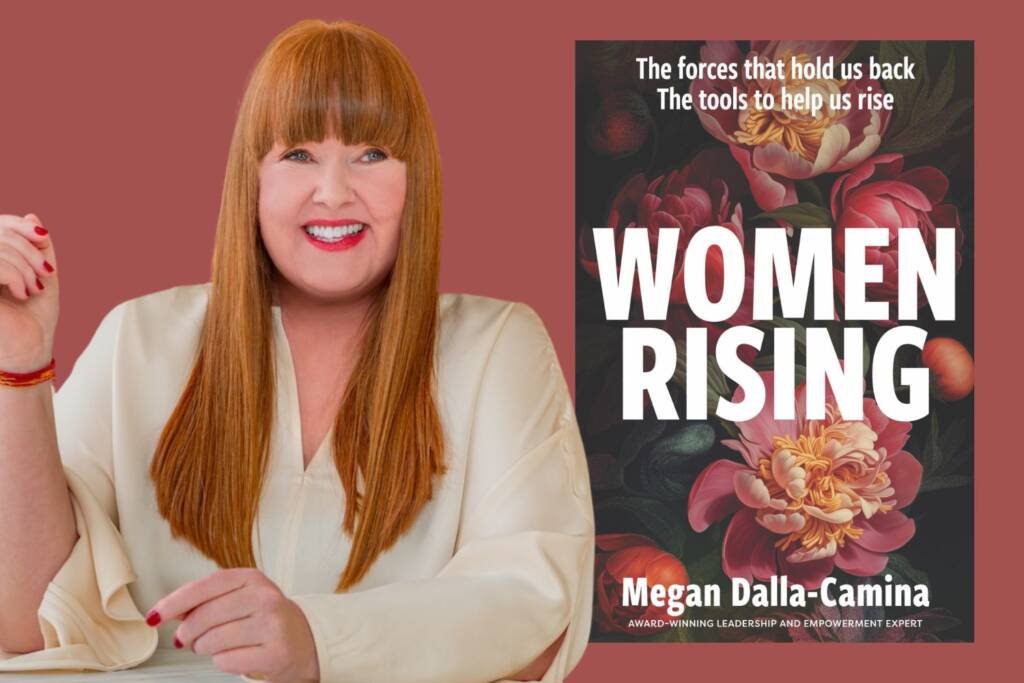Words by Megan Dalla-Camina
Award-winning women’s leadership expert Megan Dalla-Camina’s latest book, Women Rising, confronts the harsh realities of women’s rights in today’s world by tackling the root causes head-on. Despite progress, women continue to be constrained by deeply ingrained societal expectations that dictate our behaviour and limit our potential. In Women Rising, Megan empowers readers to identify and challenge the forces that shape and restrict our professional and personal lives, offering a bold path forward for women everywhere.
Your new book, Women Rising: The Forces That Hold Us Back, The Tools to Help Us Rise, unveils the paradoxes of power that women face. Could you explain what these paradoxes are and how they affect women?
The paradoxes of power are complex and contradictory expectations society places on women. For instance, the Confidence Paradox demands that women be confident but not overly assertive, or they risk being labelled as aggressive. Similarly, the Leadership Paradox encourages women to lead but often criticised them for not adhering to traditional masculine styles. These paradoxes create unique challenges in leadership, leading to self-doubt, imposter syndrome, and burnout. In Women Rising, I explore these paradoxes and provide tools to help women navigate and overcome them, enabling them to lead with authenticity and power.
You introduce the concept of The 13 Archetypes of the Inner Critic. Can you elaborate on these archetypes and how they influence women’s self-perception and growth?
The 13 Archetypes of the Inner Critic represent common patterns of self-doubt and negative self-talk that many women experience. These archetypes, such as the Perfectionist, the People Pleaser, and the Imposter, are voices within us that question our worth and capabilities. For example, the Perfectionist drives women to strive for unattainable standards, leading to burnout and fear of failure. The Imposter convinces them they don’t deserve their success, holding them back from seeking promotions or taking risks. By identifying and understanding these archetypes, women can reframe their inner dialogue, quiet these negative voices, and move forward with greater confidence in their careers.
You experienced burnout at the age of 36 led you to give up a coveted executive role and redesign your career. Tell us about that experience and how it shaped your journey?
Burnout at 36 was a pivotal moment for me. I was balancing a demanding corporate role, single motherhood, and graduate studies, all while pushing myself to meet ever-increasing demands. The result was complete exhaustion, mentally, physically, and emotionally. Stepping back from my executive role allowed me to reassess my priorities and realign my life with my core values. This experience not only led me to prioritise my well-being but I also became determined to help other women avoid the pitfalls I encountered.
You’ve earned recognition as an award-winning leadership expert and have been honoured with several awards. How have these accolades influenced your mission and impact?
These accolades have amplified my platform and validated my mission to advance gender equity but they also remind me of my responsibility to continue advocating for change and supporting women in overcoming barriers. The recognition motivates me to push even harder to make a global impact.
In your opinion, what are the most pressing barriers to gender diversity in the workplace today, and what practical steps can organisations take to overcome these barriers?
Unconscious bias, structural inequalities like the gender pay gap, and challenges related to work-life integration are most pressing. These issues are compounded by societal expectations that often limit women’s advancement. To overcome these barriers, organisations need to implement comprehensive diversity and inclusion strategies, such as bias training, equitable pay practices, and development programs that support women’s leadership as well as creating flexible work environments and engaging men as allies in gender equality.
Your research and work in wellness and positive psychology are pivotal to your approach. How do these disciplines intersect with leadership and gender diversity?
Wellness and positive psychology focus on resilience, well-being, and a strengths-based approach. Positive psychology encourages women to identify and leverage their strengths, cultivate a growth mindset, and build positive relationships, all of which are crucial for developing effective female leaders.
Spirituality, in the context of leadership, is about aligning with deeper values and purpose. It’s not about religion, but about connecting with your inner wisdom and leading with authenticity. For women, who often face conflicting societal expectations, spirituality offers a grounding force that helps them stay true to themselves while navigating the complexities of leadership.
Given the current socio-political climate, particularly in the context of movements like #MeToo and the global push for gender equality, how do you see the role of women leaders evolving in the next decade?
Movements like #MeToo and the ongoing push for gender equality have brought critical issues to the forefront, challenging the status quo and demanding greater accountability from organisations and leaders. As a result, women leaders will increasingly take on transformative roles, not only within their organisations but also in driving broader societal change. Their leadership styles, often characterised by empathy, collaboration, and a focus on long-term, sustainable success, will be essential in navigating the complex challenges of our time. I foresee a growing recognition of the importance of intersectionality in leadership, ensuring that the voices and experiences of all women and non-binary people are represented and valued.
Sometimes it feels like women are discussing gender equality in our own echo chambers. What are some of the fundamental ways we can get more men in the room to understand that gender equality is good for everyone?
To make real progress in gender equality, it’s crucial to engage men by framing it as a universal issue, not just a “women’s issue.” We need to show that gender equality benefits everyone by creating better workplaces. This can be achieved by involving men as allies in initiatives, encouraging them to mentor and sponsor women, and challenging biases. Leadership should actively include men in diversity strategies, making them part of the solution.
Your book emphasises the need for self-empowerment among women. What are some key strategies you recommend for women to cultivate their power and confidence in professional settings?
Self-empowerment is about taking ownership of your life, career, and well-being. To cultivate power and confidence in professional settings, I recommend several key strategies. First, know your worth by recognising and owning your value—reflect on your strengths, achievements, and the unique perspectives you bring. Setting clear boundaries is essential for maintaining your energy and focus. Learn to say no when necessary and prioritise tasks that align with your goals and values. Building a strong support network of mentors, peers, and allies who encourage your growth is crucial. Continuous learning is another vital strategy—invest in your personal and professional development to stay relevant and confident. Finally, speak up for yourself, advocate for your career advancement, and embrace failure as a learning opportunity.
Looking ahead, what are your hopes and aspirations for the next generation of women leaders, and how do you envision your work contributing to their success?
I hope the next generation of women leaders rises with confidence, authenticity, and a strong sense of purpose, making a real impact in every sector. I want them to feel empowered to lead in their own way, breaking free from outdated gender norms and inner doubts. Through my work—whether it’s Women Rising, my writing, or advocacy—I’m committed to giving these future leaders the tools and support they need to thrive. By addressing the challenges that women face today and providing practical solutions, I hope to pave the way for the next generation to rise even higher and achieve their full potential.







